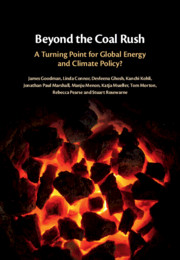Book contents
- Beyond the Coal Rush
- Beyond the Coal Rush
- Copyright page
- Contents
- Figures
- Tables
- About the Authors
- Foreword
- Acknowledgements
- Introduction
- 1 The Global Contest over Coal and Development
- 2 India
- 3 Australia
- 4 Germany
- 5 Laying the Foundations of the Coal Rush
- 6 Kyoto and the Coal Boom
- 7 Coal in a Climate-Constrained World
- 8 Conclusion
- References
- Index
1 - The Global Contest over Coal and Development
Published online by Cambridge University Press: 06 November 2020
- Beyond the Coal Rush
- Beyond the Coal Rush
- Copyright page
- Contents
- Figures
- Tables
- About the Authors
- Foreword
- Acknowledgements
- Introduction
- 1 The Global Contest over Coal and Development
- 2 India
- 3 Australia
- 4 Germany
- 5 Laying the Foundations of the Coal Rush
- 6 Kyoto and the Coal Boom
- 7 Coal in a Climate-Constrained World
- 8 Conclusion
- References
- Index
Summary
Chapter 1 introduces the book’s main theme, namely the growing global contest over the future of coal. Three main aspects are identified – the changing world-historical status of coal as the fuel of development, the shifting significance of the coal commodity in economic growth, and its impact as a central driver of climate change and ecological exhaustion. Government-led development ideology remains closely bound up with the extraction of coal as a source of energy security, yet is increasingly exposed and contested. Increased populist rejection of climate policy in the name of fossil fuel reliance reflects the growing intensity of this contest. Pro-coal political forces gain most traction where they are most threatened, in high-income coal-producing countries such as in the US, Canada and Australia, as well as in the EU. In newly industrialising contexts with lower emissions targets, such as in India, coal is challenged by new low-cost renewable energy, and by immediate health imperatives.
Keywords
- Type
- Chapter
- Information
- Beyond the Coal RushA Turning Point for Global Energy and Climate Policy?, pp. 13 - 30Publisher: Cambridge University PressPrint publication year: 2020

